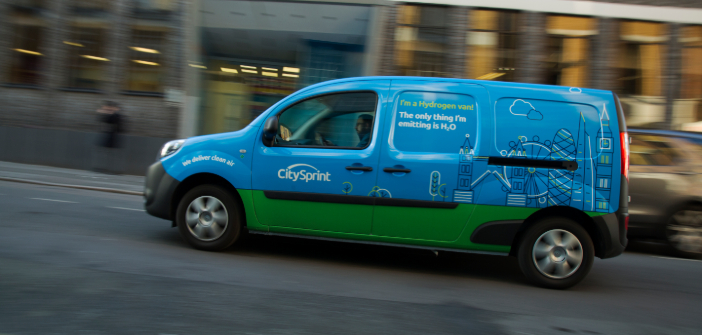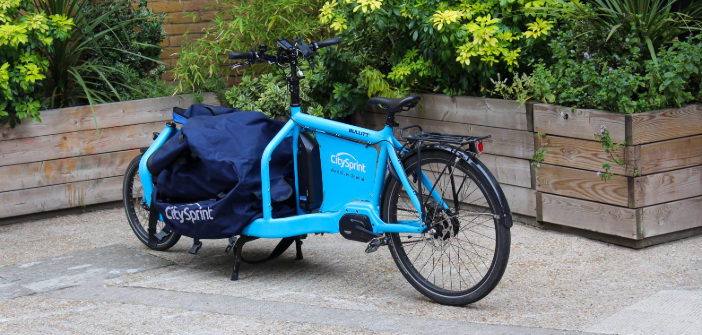The Covid-19 pandemic has affected almost every aspect of life in 2020, particularly the logistics industry.
The closure of physical stores and workplaces, mass working from home and the ramping up of healthcare services have all placed unprecedented demand on their associated supply chains and distribution partners. New ways of working have been needed and we should be proud that the logistics industry has risen to these many challenges and continued to deliver during this unprecedented global event.
With much of the population keeping safe by staying at home and indoors — effectively in a three-month hibernation period — there have also been some unplanned consequences of the lockdown.
Cities across the world have seen a significant reduction in pollution during this period. In London, the lockdown has cut traffic and led to “dramatic improvements” in the city’s air quality, according to information published by London Mayor Sadiq Khan. Specifically, Central London roadside locations have seen a fall in daily average NO2 of around 40%. These reductions are in addition to those already delivered by the ULEZ (Ultra Low Emission Zone).
This will likely change as people emerge from lockdown and the world returns to relative normality, albeit with some significant modifications to our daily lives. But it’s vital that as we go about this and also look to tackle the economic challenges resulting from Covid-19, we do not lose sight of the progress made over recent years when it comes to sustainability.
Our industry has long understood the importance of reducing the impact of its operation on the environment. New and greener vehicle types, more efficient scheduling technology and better consolidation of deliveries are all helping reduce emissions. At CitySprint, we’re proud to have a fleet that includes a variety of low-emission vehicles — including London’s first hydrogen van (below) used for logistics and a host of cargo-bikes (bottom) that can carry a similar load to a small van and which save 4 tons of GHG emissions a year and can complete jobs, on average, 50% faster than a van.
But without continued focus on this area, it will be hard to maintain the progress that has been made in recent years. Sustainability needs to be at the heart of the economy’s recovery, not an afterthought.
 Quite understandably, sustainability has not been the first focus over the last few months –London’s ULEZ was temporarily suspended and the implementation of Clean Air Zones across the country paused to help businesses continue where safe to do so.
Quite understandably, sustainability has not been the first focus over the last few months –London’s ULEZ was temporarily suspended and the implementation of Clean Air Zones across the country paused to help businesses continue where safe to do so.
But recently, Khan has reinstated the ULEZ charge and increased the London congestion charge – extending how long it is in effect for each day, to help deliver a “cleaner and greener” economic recovery. Coupled with the news that from this autumn drivers of zero-emissions cars will have a green ‘flash’ added to the left-hand side of their number plates to show they are eligible to bypass congestion zone charges or secure cheaper parking, this shows that sustainability is moving back up the agenda.
These moves may not be welcome by all, but they show sustainability has not been forgotten. As an industry, we must continue to work with policymakers to ensure barriers to the adoption of green vehicles are reduced. Today, infrastructure is insufficient to make wider take-up a reality, such as fast-charging points and easily available vehicle maintenance.
Some may question any additional regulatory or financial burden for business during a challenging period. But the appetite for more sustainable activity is there.
We undertake regular temperature-check research among leaders at UK SMEs. Recent editions of this data show continued support for green initiatives, underlining that this remains a priority for UK businesses. For example, just under half of London SMEs said ULEZ has had no impact on their operation, and those who have been affected still appear in favor of the policy – with a fifth reporting a positive impact on their business as a result. But what’s clear is that more guidance and support is also needed to help businesses become more sustainable.
The majority of respondents in our research called for more information from the government on what they can do to be more sustainable and around half of SMEs would like additional advice on how legislation may be changing in terms of sustainability requirements. UK businesses are open to green legislation, but they want more input and support from policymakers to help them understand and adapt to it.
Businesses are dealing with unprecedented levels of change and are having to adapt their operating models accordingly. It’s an ideal time to ensure that going green doesn’t slip down the agenda in the race to recovery. We have to continue to explore new vehicle types, work with customers to help them understand how to improve environmental performance and encourage policymakers to understand the challenges we face as an industry around sustainability. There is only one direction of travel that’s possible.



